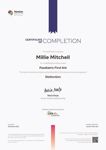Critical Thinking for Intelligence Analysts
Accredited By CPD | High-quality Materials | Video Lessons | Lifetime Access | 24/7 Tutor Support
NextGen Learning
Summary
- Exam(s) / assessment(s) is included in price
- Tutor is available to students
Add to basket or enquire
Overview
In an increasingly complex and interconnected world, intelligence analysis plays a crucial role in protecting national security. The demand for skilled intelligence analysts is growing, and there is a need for individuals with critical thinking skills and an understanding of the intelligence cycle.
According to a report by the UK Government, the security and intelligence sector is expected to grow by 3.2% per year, creating around 42,000 jobs by 2020. By taking this course, individuals can equip themselves with the skills and knowledge necessary to contribute to national security efforts in the UK.
Learning Outcomes:
- Understand the definition and purpose of intelligence analysis
- Develop an understanding of the intelligence cycle and best practices in analysis processes
- Learn the importance of critical thinking and how to structure analytical assessments
- Gain an understanding of legal issues and ethics in intelligence analysis
- Understand the roles, responsibilities, and functions of an intelligence analyst
- Be able to contribute to national security efforts through effective intelligence analysis
CPD
Course media
Description
Course Curriculum:
Module 01: Defining Intelligence Analysis - In this module, you will learn the definition and purpose of intelligence analysis, including the types of intelligence and the role of the intelligence analyst.
Module 02: Development of Intelligence Analysis - This module will cover the historical development of intelligence analysis, including the evolution of intelligence gathering and analysis techniques.
Module 03: The Intelligence Cycle - In this module, you will learn about the intelligence cycle, including its stages and the role of the analyst in each stage.
Module 04: Critical Thinking and Structuring - This module will cover critical thinking, including its importance in intelligence analysis and how to structure analytical assessments.
Module 05: Analysis Process and Best Practice - In this module, you will learn best practices in the analysis process, including the use of analytical tools and techniques.
Module 06: Intelligence and National Security - This module will cover the role of intelligence in national security, including its contribution to policy-making and the prevention of threats.
Module 07: Legal Issues and Ethics - In this module, you will learn about legal issues and ethics in intelligence analysis, including privacy and human rights concerns.
Module 08: Your Role, Responsibilities, and Functions as an Analyst - This module will cover the roles, responsibilities, and functions of an intelligence analyst, including effective communication, teamwork, and report writing.
Certification
Upon completion of the course, learners can obtain a certificate as proof of their achievement. You can receive a £4.99 PDF Certificate sent via email, a £9.99 Printed Hardcopy Certificate for delivery in the UK, or a £19.99 Printed Hardcopy Certificate for international delivery. Each option depends on individual preferences and locations.
Who is this course for?
- Individuals interested in pursuing a career in intelligence analysis
- Current intelligence analysts seeking to enhance their skills and knowledge
Career path
- Intelligence Analyst: £25,000-£50,000 per year
- Senior Intelligence Analyst: £40,000-£80,000 per year
- Intelligence Officer: £30,000-£60,000 per year
- Security Analyst: £35,000-£70,000 per year
Questions and answers
Currently there are no Q&As for this course. Be the first to ask a question.
Reviews
Currently there are no reviews for this course. Be the first to leave a review.
Legal information
This course is advertised on reed.co.uk by the Course Provider, whose terms and conditions apply. Purchases are made directly from the Course Provider, and as such, content and materials are supplied by the Course Provider directly. Reed is acting as agent and not reseller in relation to this course. Reed's only responsibility is to facilitate your payment for the course. It is your responsibility to review and agree to the Course Provider's terms and conditions and satisfy yourself as to the suitability of the course you intend to purchase. Reed will not have any responsibility for the content of the course and/or associated materials.




